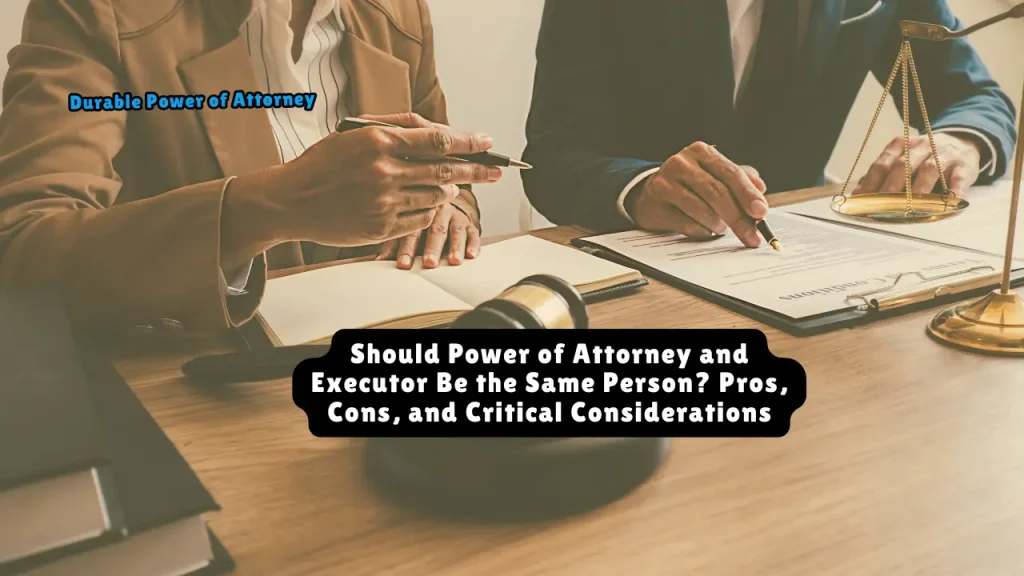Should Power of Attorney and Executor Be the Same Person? Pros, Cons, and Critical Considerations
Yes, a Power of Attorney (POA) and executor can be the same person, but it’s not always advisable. While this simplifies communication and ensures continuity, it risks conflicts of interest, burnout, and family disputes. The decision hinges on trust, estate complexity, and the individual’s ability to manage dual responsibilities ethically and efficiently.
Table of Contents
Understanding the Roles
1. Power of Attorney (POA)
- Role: Manages financial, legal, and healthcare decisions for the principal during their lifetime (if incapacitated).
- Scope: Pays bills, manages investments, sells property, and makes medical choices.
- Duration: Ends at the principal’s death.
2. Executor
- Role: Administers the estate after death, per the will’s terms.
- Scope: Settles debts, files taxes, distributes assets, and handles probate.
- Duration: Ends once the estate is settled (months to years).
Pros of Naming the Same Person
1. Continuity and Familiarity
The same person understands the principal’s wishes, assets, and obligations, reducing transition gaps.
Example:
A daughter serving as POA and executor seamlessly used her mother’s financial records to pay end-of-life medical bills and later distribute her estate, avoiding probate delays.
2. Streamlined Decision-Making
No need to coordinate between multiple parties, which is helpful for complex estates.
Expert Quote:
“When the POA and executor are aligned, it minimizes confusion—especially if the principal’s affairs are already well-organized.”
— Emily Carter, Estate Attorney (Forbes, 2023).
Read also: What Is Reasonable Compensation For A Power Of Attorney?
3. Cost Savings
Avoids paying two separate professionals (e.g., attorneys or financial advisors).
Cons of Naming the Same Person
1. Conflicts of Interest
The agent might prioritize their future role as executor over the principal’s immediate needs.
Example:
In Estate of Johnson v. Smith (California, 2021), a son serving as POA and executor sold his father’s property below market value to a friend, planning to split profits post-death. The court revoked his authority and charged him with fraud.
2. Overburdening
Managing healthcare, finances, and probate can overwhelm one person.
Expert Quote:
“Executorship is a marathon, not a sprint. Adding POA duties can lead to costly mistakes.”
— David Reynolds, Probate Lawyer (American Bar Association, 2022).
3. Family Distrust
Siblings may suspect favoritism or mismanagement, especially if the agent inherits assets.
Real-Life Case:
A Texas family sued their brother (POA/executor) for moving their mother into a cheaper nursing home to “preserve his inheritance.” The court-appointed a neutral trustee.
Key Factors to Consider
1. Trustworthiness
- Does the person have a history of financial responsibility?
- Are they impartial (e.g., not a beneficiary with a large stake)?
2. Estate Complexity
- Simple Estates (e.g., single home, few accounts): One person may suffice.
- Complex Estates (businesses, multiple properties, debts): Split roles for checks and balances.
3. Family Dynamics
- High-conflict families benefit from separate, neutral parties.
- Example: A celebrity’s estate used separate POA and executor to prevent sibling disputes over royalties.
4. Legal and State Rules
- Florida: Requires executors to post a bond unless waived in the will—POA agents aren’t subject to this.
- New York: Allows “bond waivers” for executors but not POAs.
Related article:
Can Power of Attorney Sell Property Before Death? Legal Authority, Risks & Process

Alternatives to Consider
1. Co-Agents or Co-Executors
Split responsibilities between two trusted parties (e.g., one handles healthcare, the other finances).
2. Professional Fiduciaries
Hire an attorney or bank to act as executor, ensuring impartiality.
3. Revocable Living Trust
A trustee manages assets during and after life, bypassing the need for separate POA/executor roles.
How to Protect Yourself
For Principals:
- Add Safeguards: Require the POA/executor to provide annual reports to a third party.
- Specify Limits: “My executor cannot sell real estate without sibling consent.”
For Agents/Executors:
- Document Everything: Keep records of all transactions and decisions.
- Consult Professionals: Hire probate attorneys or CPAs for complex tasks.
Final Takeaways
- Pros: Streamlined decisions, cost savings, continuity.
- Cons: Risk of abuse, burnout, family conflicts.
- Ideal For: Small estates, highly trusted agents, low-conflict families.
Bottom Line: While legal, naming the same person as POA and executor requires careful planning. Prioritize transparency, accountability, and professional guidance to protect your legacy.
Checklist for Decision-Making
- Assess the agent’s trustworthiness and capability.
- Review estate complexity and family dynamics.
- Consult an estate attorney for state-specific advice.
- Update documents to include oversight clauses.
Need Help?
- American College of Trust and Estate Counsel (ACTEC): Find a Lawyer
- AARP Estate Planning Guide: Free Resources
About the Author

Sarah Klein, JD, is an experienced estate planning attorney who has helped clients with wills, trusts, powers of attorney, and probate matters. At All About Lawyer, she simplifies complex estate laws so families can protect their assets, plan ahead, and avoid legal headaches during life’s most sensitive moments.
Read more about Sarah
